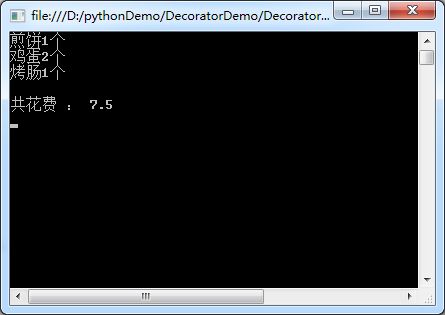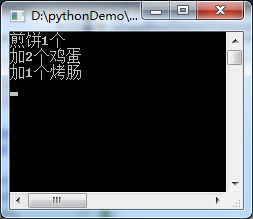- 常见框架漏洞之二:struts2
执念WRD
struts后端框架漏洞
简介ApacheStruts2最初被称为WebWork2,它是⼀个简洁的、可扩展的框架,可⽤于创建企业级Javaweb应⽤程序。设计这个框架是为了从构建、部署、到应⽤程序维护⽅⾯来简化整个开发周期。■Struts2是⼀个基于MVC设计模式的web应⽤框架:MVC:模型(Model)、视图(View)、控制器(Controller):■模型---属于软件设计模式的底层基础,主要负责数据维护。■视图-
- 结构型——组合模式
每天减 1/5kg
组合模式
组合模式组合模式是一种结构型设计模式,用于将对象组合成树形结构以表示“部分-整体”的层次关系。使得客户端能够以统一的方式处理单个对象和组合对象特点统一接口:客户端无需区分操作的是单个对象还是组合对象。递归结构:组合对象可以嵌套其他组合对象或者叶子节点,形成树形结构。透明性:所有的方法都在已抽象组件中声明动态拓展:新增组件类型时,无需修改现有代码模式结构角色描述抽象组件(Component)定义组合
- 设计模式:单例模式
漫步码生
单例模式设计模式java
单例模式什么是单例模式单例模式Demo其他小结什么是单例模式什么是单例模式?答:是设计模式的一种。先来看下标准答案:单例模式是一种设计模式,确保一个类只有一个实例,并提供一个全局访问点来获取该实例。乍一看有些不好理解,仔细看还是不好理解。下面给出一个简单的demo。publicclassSingleton{//1.静态私有变量并将静态变量指向自身类型,实现的是确保一个类只有一个实例privates
- Java 中装饰者模式与策略模式在埋点系统中的应用
Vic10101
开发实战项目总结Java性能优化java策略模式开发语言
前言在软件开发中,装饰者模式和策略模式是两种常用的设计模式,它们在特定的业务场景下能够发挥巨大的作用。本文将通过一个实际的埋点系统案例,探讨如何在Java中运用装饰者模式和策略模式,以及如何结合工厂方法模式来优化代码结构。业务场景分析随着互联网的发展,用户行为分析变得越来越重要,而埋点技术是实现用户行为分析的关键手段之一。埋点系统需要记录用户在应用中的各种操作行为,如点击、浏览、提交等,以便后续进
- 23种设计模式-代理(Proxy)设计模式
程序员汉升
#设计模式设计模式代理模式结构型设计模式Java
代理设计模式什么是代理设计模式?代理设计模式的特点代理设计模式的结构代理设计模式的优缺点代理设计模式的Java实现代码总结总结什么是代理设计模式?代理设计模式(ProxyPattern)是一种结构型设计模式,它为其他对象提供一种代理以控制对这个对象的访问。代理模式通过创建一个代理对象,在客户端和目标对象之间起到中介作用,可以在不改变原始类代码的情况下增加额外的功能。使用场景当需要控制对对象的访问时
- 设计模式分享概述
生菜无双
设计模式干货分享设计模式java大数据
设计模式分享概述好代码VS烂代码一些深层原则深入学习设计模式的好处如何评价代码质量的高低?面向对象、设计原则、设计模式、编程规范、重构,包含哪些内容及这五者有何关系?好代码VS烂代码很多人写出烂代码的程序员往往会跟自己找借口——时间紧、任务重等,但是其实写烂代码和好代码花费的时间是差不多的。一些深层原则大道至简:思从深而行从简,其实包括写代码在内的任何事,如果感觉比较甚至越来越复杂、混乱、浆糊等。
- 设计模式 一、软件设计原则
kkkkatoq
设计模式设计模式
一、理解设计原则1、单一原则1.1如何理解单一职责原则(SRP)单一职责原则(SingleResponsibilityPrinciple,简称SRP),他要求一个类或模块应该只负责一个特定的功能,这有助于降低类之间的耦合度,提高代码的可读性和可维护性。单一职责原则的定义非常简单,一个类只负责完成一个职责或者功能,也就是说,不要设计大而全的类,要设计粒度小、功能单一的类,换个角度来讲,就是一个类包含
- 23种设计模式中的策略模式
cijiancao
设计模式设计模式策略模式
在策略模式定义了一系列算法或策略,并将每个算法封装在独立的类中,使得它们可以互相替换。通过使用策略模式,可以在运行时根据需要选择不同的算法,而不需要修改客户端代码。策略模式:Strategy。指的是,定义了一组算法,并将每个算法封装在独立的类中。然后在运行的时候,可以灵活的选择其中的一个算法。在这里我们根据案例来具体学习策略模式。以下是代码示例及知识点详解。我们以去餐厅吃饭,选择不同的支付方式为例
- 23种设计模式(扩展)
懒羊羊大王&
c++(初阶)设计模式
文章目录一、设计模式的来源二、设计模式的六大原则(SOLID)三、设计模式的三大类四、23种设计模式1、工厂模式2、单例模式3、建造者模式(构建者模式)4、原型模式5、适配器模式(重要)6、装饰器模式7、代理模式8、外观模式9、桥接模式10、组合模式11、享元模式12、策略模式13、模板模式14、观察者模式15、迭代器模式属于行为型模式。16、责任链模式17、命令模式18、备忘录模式19、状态模式
- 【设计模式】SOLID 设计原则概述
白码思
设计模式
SOLID是面向对象设计中的五大原则,不管什么面向对象的语言,这个准则都很重要,如果你没听说过,赶紧先学一下。它可以提高代码的可维护性、可扩展性和可读性,使代码更加健壮、易于测试和扩展。SOLID代表以下五个设计原则:S-单一职责原则(SingleResponsibilityPrinciple,SRP)O-开闭原则(Open/ClosedPrinciple,OCP)L-里氏替换原则(LiskovS
- Spring MVC配置详解:从历史到实战
wertuiop_
springmvcjava
文章目录一、JavaWeb的发展历程1.ModelI与ModelII开发模式(1)ModelI开发模式(2)ModelII开发模式2.MVC设计模式SpringMVC本质MVC工作流程二、SpringMVC快速入门实战1.环境搭建步骤(1)创建MavenWeb工程(2)配置web.xml(3)SpringMVC配置文件(springmvc.xml)(4)编写Controller(5)创建视图页面三
- 施磊老师高级c++(六)
Zhuai-行淮
施磊老师cppc++开发语言
文章目录四、代理模式(结构型模式)基本概念核心代码逻辑--重点**代码示例:**五、装饰器模式(结构型模式)-重点在于不修改原来的代码基本概念代码核心逻辑代码示例六、适配器模式(结构型模式)基本概念代码逻辑核心**代码示例:**七、观察者模式(行为型模式)基本概念代码核心逻辑**代码示例:**四、代理模式(结构型模式)基本概念proxy–代理注意:在很多设计模式中,都会用到基类指针指向派生类对象,
- 红宝书第十二讲:详解JavaScript中的工厂模式与原型模式等各种设计模式
前端javascript
红宝书第十二讲:详解JavaScript中的工厂模式与原型模式等各种设计模式资料取自《JavaScript高级程序设计(第5版)》。查看总目录:红宝书学习大纲工厂模式和原型模式解析一、工厂模式:像订外卖一样创建对象工厂模式就像一个“对象生成器”,只需要告诉它“我要什么”,它就会自动生成并返回对应的对象。适合需要批量创建复杂对象的场景1。案例:点餐系统假设你经营奶茶店,需要根据订单类型生成不同配置的
- 红宝书第十二讲:详解JavaScript中的工厂模式与原型模式等各种设计模式
前端javascript
红宝书第十二讲:详解JavaScript中的工厂模式与原型模式等各种设计模式资料取自《JavaScript高级程序设计(第5版)》。查看总目录:红宝书学习大纲工厂模式和原型模式解析一、工厂模式:像订外卖一样创建对象工厂模式就像一个“对象生成器”,只需要告诉它“我要什么”,它就会自动生成并返回对应的对象。适合需要批量创建复杂对象的场景1。案例:点餐系统假设你经营奶茶店,需要根据订单类型生成不同配置的
- Spring Boot事件机制详解
AWen_X
言简意赅系列之Springspringboot后端javaspring开发语言
SpringBoot事件机制详解1.事件机制基础1.1什么是事件驱动架构事件驱动架构(Event-DrivenArchitecture,EDA)是一种软件设计模式,其中系统组件通过事件的发布与订阅进行通信。在SpringBoot中,事件机制为应用程序提供了松耦合的组件间通信方式,使得发布者无需关心谁在监听,监听者也无需了解事件来源。这种设计类似于现实生活中的"广播通知":广播站(事件发布者)发布新
- 23种设计模式之状态模式
岳轩子
设计模式设计模式状态模式java
目录1.简介2.代码2.1State(定义抽象状态接口)2.2StartState(实现具体状态类)2.3EndState(实现具体状态类)2.4Context(定义上下文类)2.5Test(测试类)2.6运行结果3.使用场景4.优缺点5.总结1.简介状态模式(StatePattern)是一种行为型设计模式,允许对象在其内部状态改变时改变其行为。这种模式通过将对象的状态和行为解耦,使得状态的变化不
- 23种设计模式-原型(Prototype)设计模式
程序员汉升
#设计模式原型模式设计模式
原型设计模式什么是原型设计模式?原型设计模式的特点原型设计模式的结构原型设计模式的优缺点原型设计模式的Java实现代码总结总结什么是原型设计模式?原型模式(PrototypePattern)是创建型设计模式,它用于克隆对象,而不是重新创建它们。在原型模式中,我们创建一个对象作为原型,并允许其克隆多个副本,而不必重新初始化所有字段。使用场景创建对象开销较大,但又需要多个相似对象。对象的构造过程复杂,
- 【设计模式】常用的设计模式详解
色空大师
设计模式java
常用设计模式常用设计模式介绍设计模式的分类工厂模式工厂模式1.场景介绍案例代码参考链接常用设计模式介绍设计模式的分类创建型模式(Creational):关注对象的实例化过程,包括了如何实例化对象、隐藏对象的创建细节等。常见的创建型模式有单例模式、工厂模式、抽象工厂模式等。结构型模式(Structural):关注对象之间的组合方式,以达到构建更大结构的目标。这些模式帮助你定义对象之间的关系,从而实现
- 03-JAVA设计模式-状态模式
丨Anna丨
技术栈#Java设计模式java设计模式状态模式
状态模式什么是状态模式Java中的状态模式(StatePattern)是一种行为型设计模式,主要用于解决系统中复杂对象的状态转换以及不同状态下行为的封装问题。状态模式允许一个对象在其内部状态改变时改变它的行为,使得对象看起来似乎修改了它的类。优点:结构清晰:通过将状态转换逻辑分布到独立的状态类中,状态模式将对象的行为与对应的状态分离,使得代码结构更加清晰,易于理解。灵活性和可扩展性:状态模式使得在
- 23种设计模式-创建型模式-抽象工厂
诺亚凹凸曼
23种设计模式设计模式javaandroid
文章目录简介场景问题1.风格一致性失控2.对象创建硬编码3.产品族管理失效解决总结简介抽象工厂是一种创建型设计模式,可以生成相关对象系列,而无需指定它们的具体类。场景假设你正在写一个家具店模拟器。你的代码这些类组成:相关产品系列,例如:椅子+沙发+咖啡桌。此系列有多种风格。例如,椅子+沙发+咖啡桌系列有以下风格:现代、维多利亚、装饰艺术。你需要一种方法来创建家具对象,确保它们与同一风格的其他对象相
- Java设计模式-状态模式State
罗汉爷
Java-Core#设计模式状态模式java设计模式
介绍状态模式(StatePattern):它主要用来解决对象在多种状态转换时,需要对外输出不同的行为的问题。状态和行为是一一对应的,状态之间可以相互转换。当一个对象的内在状态改变时,允许改变其行为,这个对象看起来像是改变了其类。原理类图对原理类图的说明-即(状态模式的角色及职责):Context类为环境角色,用于维护State实例,这个实例定义当前状态State是抽象状态角色,定义一个接口封装与C
- Android第六次面试总结(Java设计模式二)
每次的天空
android面试设计模式
在Android开发里,ListView和RecyclerView是常用的视图组件,用于展示大量数据列表。不过,这些视图组件本身无法直接展示原始数据源,需要借助Adapter(适配器)把数据源适配成视图能够展示的数据,这便是适配器模式的实际应用。下面详细介绍Adapter在ListView和RecyclerView中的使用。适配器模式原理适配器模式的核心在于把一个类的接口转换为客户期望的另一个接口
- 结构型——外观模式
每天减 1/5kg
外观模式python设计模式
外观模式外观模式是一种将复杂的子系统抽象出一个简化的统一接口以供客户端使用的结构型设计模式。他的核心思想就是化繁为简,隐藏子系统的内部复杂性,降低客户端与子系统的耦合性。特点简化接口:将多个子系统的交互抽象为外观类中的方法接口。解耦:客户端与子系统之间解耦,客户端只需与外观类交互,无需了解子系统的细节。分层设计:外观类可作为中间层,将复杂的子系统进行逻辑分组,便于管理。模式结构角色描述外观类(Fa
- 23种设计模式-外观(Facade)设计模式
程序员汉升
#设计模式设计模式外观模式结构型设计模式Java
外观设计模式什么是外观设计模式?外观设计模式的特点外观设计模式的结构外观设计模式的优缺点外观设计模式的Java实现代码总结总结什么是外观设计模式?外观设计模式(FacadePattern)是一种结构型设计模式,它提供了一个统一的接口,用于访问子系统中的一组接口。外观模式通过定义一个高层接口,简化了客户端与子系统之间的交互,隐藏了子系统的复杂性。使用场景当需要为复杂的子系统提供一个简单的接口时。当需
- 设计模式|责任链模式(Chain of Responsibility Pattern)
进击的小白菜
设计模式设计模式责任链模式java
文章目录结构优点缺点使用责任链的步骤示例有哪些知名框架采用了责任链模式责任链模式和链表有什么关联常见面试题责任链模式(ChainofResponsibilityPattern)是一种行为设计模式,它允许你创建一个对象链。请求将沿着这个链传递,直到有一个对象处理它为止。这种模式可以使请求的发送者和接收者解耦。当想让一个以上的对象有机会能够处理同一请求的时候,就可以使用责任链模式(ChaninofRe
- 领域驱动设计模式、原理与实践_领域驱动设计学习之路—DDD的原则与实践
餘弦Inverse
领域驱动设计模式原理与实践
本文是我学习ScottMillett&NickTune编著的《领域驱动设计模式、原理与实践》一书的学习笔记,一共会分为4个部分如下,此文为第1部分:领域驱动设计的原则与实践战略模式:在有界上下文之间通信战术模式:创建有效的领域模型有效应用程序的设计模式一、什么是领域驱动设计脑图浏览:https://www.processon.com/view/5cb49b14e4b0a13c9de1042d#ma
- Vue3组件设计模式:高可复用性组件开发实战
武昌库里写JAVA
面试题汇总与解析课程设计springbootvue.js毕业设计element-ui
Vue3组件设计模式:高可复用性组件开发实战一、前言在Vue3中,组件设计和开发是非常重要的,它直接影响到应用的可维护性和可复用性。本文将介绍如何利用Vue3组件设计模式来开发高可复用性的组件,让你的组件更加灵活和易于维护。二、单一职责原则在组件设计中,单一职责原则是非常重要的。一个组件应该只关注于一件事情,这样可以使组件更加灵活和易于重用。当一个组件承担了太多的责任时,它就会变得难以维护和修改。
- 设计模式之责任链模式:原理、实现与应用
wenbin_java
设计模式责任链模式java
引言责任链模式(ChainofResponsibilityPattern)是一种行为型设计模式,它允许多个对象有机会处理请求,从而避免请求的发送者与接收者之间的耦合。责任链模式通过将多个处理对象连接成一条链,使得请求沿着链传递,直到有对象处理它为止。本文将深入探讨责任链模式的原理、实现方式以及实际应用场景,帮助你更好地理解和使用这一设计模式。1.责任链模式的核心概念1.1什么是责任链模式?责任链模
- 23种设计模式-生成器(Builder)设计模式
程序员汉升
#设计模式设计模式生成器模式java
工厂方法设计模式什么是生成器设计模式?生成器设计模式的特点生成器设计模式的结构生成器设计模式的优缺点生成器设计模式的Java实现代码总结总结什么是生成器设计模式?生成器模式(BuilderPattern)是一种创建型设计模式,用于构建复杂对象,并且能够一步步地构造对象,而无需直接使用构造函数传递大量参数。在Java中,如果一个类有多个可选参数,传统方式是使用重载构造函数或Setter方法,但这样会
- Java基础面试知识路线
Adellle
java面试开发语言
Java基础语法与数据类型面向对象编程异常处理Java内存管理常用Java库输入输出(I/O)基础多线程基础设计模式Java基础语法与数据类型JDK和JRE有什么区别?JRE指的是Java运行环境,包括JVM,核心类库,和其他支持运行Java程序的文件。JDK是JRE的超集,是用于开发Java程序的完整开发环境,包含JRE,以及开发、调试和监控Java应用程序的工具。Java中的基本数据类型和包装
- 设计模式介绍
tntxia
设计模式
设计模式来源于土木工程师 克里斯托弗 亚历山大(http://en.wikipedia.org/wiki/Christopher_Alexander)的早期作品。他经常发表一些作品,内容是总结他在解决设计问题方面的经验,以及这些知识与城市和建筑模式之间有何关联。有一天,亚历山大突然发现,重复使用这些模式可以让某些设计构造取得我们期望的最佳效果。
亚历山大与萨拉-石川佳纯和穆雷 西乐弗斯坦合作
- android高级组件使用(一)
百合不是茶
androidRatingBarSpinner
1、自动完成文本框(AutoCompleteTextView)
AutoCompleteTextView从EditText派生出来,实际上也是一个文本编辑框,但它比普通编辑框多一个功能:当用户输入一个字符后,自动完成文本框会显示一个下拉菜单,供用户从中选择,当用户选择某个菜单项之后,AutoCompleteTextView按用户选择自动填写该文本框。
使用AutoCompleteTex
- [网络与通讯]路由器市场大有潜力可挖掘
comsci
网络
如果国内的电子厂商和计算机设备厂商觉得手机市场已经有点饱和了,那么可以考虑一下交换机和路由器市场的进入问题.....
这方面的技术和知识,目前处在一个开放型的状态,有利于各类小型电子企业进入
&nbs
- 自写简单Redis内存统计shell
商人shang
Linux shell统计Redis内存
#!/bin/bash
address="192.168.150.128:6666,192.168.150.128:6666"
hosts=(${address//,/ })
sfile="staticts.log"
for hostitem in ${hosts[@]}
do
ipport=(${hostitem
- 单例模式(饿汉 vs懒汉)
oloz
单例模式
package 单例模式;
/*
* 应用场景:保证在整个应用之中某个对象的实例只有一个
* 单例模式种的《 懒汉模式》
* */
public class Singleton {
//01 将构造方法私有化,外界就无法用new Singleton()的方式获得实例
private Singleton(){};
//02 申明类得唯一实例
priva
- springMvc json支持
杨白白
json springmvc
1.Spring mvc处理json需要使用jackson的类库,因此需要先引入jackson包
2在spring mvc中解析输入为json格式的数据:使用@RequestBody来设置输入
@RequestMapping("helloJson")
public @ResponseBody
JsonTest helloJson() {
- android播放,掃描添加本地音頻文件
小桔子
最近幾乎沒有什麽事情,繼續鼓搗我的小東西。想在項目中加入一個簡易的音樂播放器功能,就像華為p6桌面上那麼大小的音樂播放器。用過天天動聽或者QQ音樂播放器的人都知道,可已通過本地掃描添加歌曲。不知道他們是怎麼實現的,我覺得應該掃描設備上的所有文件,過濾出音頻文件,每個文件實例化為一個實體,記錄文件名、路徑、歌手、類型、大小等信息。具體算法思想,
- oracle常用命令
aichenglong
oracledba常用命令
1 创建临时表空间
create temporary tablespace user_temp
tempfile 'D:\oracle\oradata\Oracle9i\user_temp.dbf'
size 50m
autoextend on
next 50m maxsize 20480m
extent management local
- 25个Eclipse插件
AILIKES
eclipse插件
提高代码质量的插件1. FindBugsFindBugs可以帮你找到Java代码中的bug,它使用Lesser GNU Public License的自由软件许可。2. CheckstyleCheckstyle插件可以集成到Eclipse IDE中去,能确保Java代码遵循标准代码样式。3. ECLemmaECLemma是一款拥有Eclipse Public License许可的免费工具,它提供了
- Spring MVC拦截器+注解方式实现防止表单重复提交
baalwolf
spring mvc
原理:在新建页面中Session保存token随机码,当保存时验证,通过后删除,当再次点击保存时由于服务器端的Session中已经不存在了,所有无法验证通过。
1.新建注解:
? 1 2 3 4 5 6 7 8 9 10 11 12 13 14 15 16 17 18
- 《Javascript高级程序设计(第3版)》闭包理解
bijian1013
JavaScript
“闭包是指有权访问另一个函数作用域中的变量的函数。”--《Javascript高级程序设计(第3版)》
看以下代码:
<script type="text/javascript">
function outer() {
var i = 10;
return f
- AngularJS Module类的方法
bijian1013
JavaScriptAngularJSModule
AngularJS中的Module类负责定义应用如何启动,它还可以通过声明的方式定义应用中的各个片段。我们来看看它是如何实现这些功能的。
一.Main方法在哪里
如果你是从Java或者Python编程语言转过来的,那么你可能很想知道AngularJS里面的main方法在哪里?这个把所
- [Maven学习笔记七]Maven插件和目标
bit1129
maven插件
插件(plugin)和目标(goal)
Maven,就其本质而言,是一个插件执行框架,Maven的每个目标的执行逻辑都是由插件来完成的,一个插件可以有1个或者几个目标,比如maven-compiler-plugin插件包含compile和testCompile,即maven-compiler-plugin提供了源代码编译和测试源代码编译的两个目标
使用插件和目标使得我们可以干预
- 【Hadoop八】Yarn的资源调度策略
bit1129
hadoop
1. Hadoop的三种调度策略
Hadoop提供了3中作业调用的策略,
FIFO Scheduler
Fair Scheduler
Capacity Scheduler
以上三种调度算法,在Hadoop MR1中就引入了,在Yarn中对它们进行了改进和完善.Fair和Capacity Scheduler用于多用户共享的资源调度
2. 多用户资源共享的调度
- Nginx使用Linux内存加速静态文件访问
ronin47
Nginx是一个非常出色的静态资源web服务器。如果你嫌它还不够快,可以把放在磁盘中的文件,映射到内存中,减少高并发下的磁盘IO。
先做几个假设。nginx.conf中所配置站点的路径是/home/wwwroot/res,站点所对应文件原始存储路径:/opt/web/res
shell脚本非常简单,思路就是拷贝资源文件到内存中,然后在把网站的静态文件链接指向到内存中即可。具体如下:
- 关于Unity3D中的Shader的知识
brotherlamp
unityunity资料unity教程unity视频unity自学
首先先解释下Unity3D的Shader,Unity里面的Shaders是使用一种叫ShaderLab的语言编写的,它同微软的FX文件或者NVIDIA的CgFX有些类似。传统意义上的vertex shader和pixel shader还是使用标准的Cg/HLSL 编程语言编写的。因此Unity文档里面的Shader,都是指用ShaderLab编写的代码,然后我们来看下Unity3D自带的60多个S
- CopyOnWriteArrayList vs ArrayList
bylijinnan
java
package com.ljn.base;
import java.util.ArrayList;
import java.util.Iterator;
import java.util.List;
import java.util.concurrent.CopyOnWriteArrayList;
/**
* 总述:
* 1.ArrayListi不是线程安全的,CopyO
- 内存中栈和堆的区别
chicony
内存
1、内存分配方面:
堆:一般由程序员分配释放, 若程序员不释放,程序结束时可能由OS回收 。注意它与数据结构中的堆是两回事,分配方式是类似于链表。可能用到的关键字如下:new、malloc、delete、free等等。
栈:由编译器(Compiler)自动分配释放,存放函数的参数值,局部变量的值等。其操作方式类似于数据结构中
- 回答一位网友对Scala的提问
chenchao051
scalamap
本来准备在私信里直接回复了,但是发现不太方便,就简要回答在这里。 问题 写道 对于scala的简洁十分佩服,但又觉得比较晦涩,例如一例,Map("a" -> List(11,111)).flatMap(_._2),可否说下最后那个函数做了什么,真正在开发的时候也会如此简洁?谢谢
先回答一点,在实际使用中,Scala毫无疑问就是这么简单。
- mysql 取每组前几条记录
daizj
mysql分组最大值最小值每组三条记录
一、对分组的记录取前N条记录:例如:取每组的前3条最大的记录 1.用子查询: SELECT * FROM tableName a WHERE 3> (SELECT COUNT(*) FROM tableName b WHERE b.id=a.id AND b.cnt>a. cnt) ORDER BY a.id,a.account DE
- HTTP深入浅出 http请求
dcj3sjt126com
http
HTTP(HyperText Transfer Protocol)是一套计算机通过网络进行通信的规则。计算机专家设计出HTTP,使HTTP客户(如Web浏览器)能够从HTTP服务器(Web服务器)请求信息和服务,HTTP目前协议的版本是1.1.HTTP是一种无状态的协议,无状态是指Web浏览器和Web服务器之间不需要建立持久的连接,这意味着当一个客户端向服务器端发出请求,然后We
- 判断MySQL记录是否存在方法比较
dcj3sjt126com
mysql
把数据写入到数据库的时,常常会碰到先要检测要插入的记录是否存在,然后决定是否要写入。
我这里总结了判断记录是否存在的常用方法:
sql语句: select count ( * ) from tablename;
然后读取count(*)的值判断记录是否存在。对于这种方法性能上有些浪费,我们只是想判断记录记录是否存在,没有必要全部都查出来。
- 对HTML XML的一点认识
e200702084
htmlxml
感谢http://www.w3school.com.cn提供的资料
HTML 文档中的每个成分都是一个节点。
节点
根据 DOM,HTML 文档中的每个成分都是一个节点。
DOM 是这样规定的:
整个文档是一个文档节点
每个 HTML 标签是一个元素节点
包含在 HTML 元素中的文本是文本节点
每一个 HTML 属性是一个属性节点
注释属于注释节点
Node 层次
- jquery分页插件
genaiwei
jqueryWeb前端分页插件
//jquery页码控件// 创建一个闭包 (function($) { // 插件的定义 $.fn.pageTool = function(options) { var totalPa
- Mybatis与Ibatis对照入门于学习
Josh_Persistence
mybatisibatis区别联系
一、为什么使用IBatis/Mybatis
对于从事 Java EE 的开发人员来说,iBatis 是一个再熟悉不过的持久层框架了,在 Hibernate、JPA 这样的一站式对象 / 关系映射(O/R Mapping)解决方案盛行之前,iBaits 基本是持久层框架的不二选择。即使在持久层框架层出不穷的今天,iBatis 凭借着易学易用、
- C中怎样合理决定使用那种整数类型?
秋风扫落叶
c数据类型
如果需要大数值(大于32767或小于32767), 使用long 型。 否则, 如果空间很重要 (如有大数组或很多结构), 使用 short 型。 除此之外, 就使用 int 型。 如果严格定义的溢出特征很重要而负值无关紧要, 或者你希望在操作二进制位和字节时避免符号扩展的问题, 请使用对应的无符号类型。 但是, 要注意在表达式中混用有符号和无符号值的情况。
&nbs
- maven问题
zhb8015
maven问题
问题1:
Eclipse 中 新建maven项目 无法添加src/main/java 问题
eclipse创建maevn web项目,在选择maven_archetype_web原型后,默认只有src/main/resources这个Source Floder。
按照maven目录结构,添加src/main/ja
- (二)androidpn-server tomcat版源码解析之--push消息处理
spjich
javaandrodipn推送
在 (一)androidpn-server tomcat版源码解析之--项目启动这篇中,已经描述了整个推送服务器的启动过程,并且把握到了消息的入口即XmppIoHandler这个类,今天我将继续往下分析下面的核心代码,主要分为3大块,链接创建,消息的发送,链接关闭。
先贴一段XmppIoHandler的部分代码
/**
* Invoked from an I/O proc
- 用js中的formData类型解决ajax提交表单时文件不能被serialize方法序列化的问题
中华好儿孙
JavaScriptAjaxWeb上传文件FormData
var formData = new FormData($("#inputFileForm")[0]);
$.ajax({
type:'post',
url:webRoot+"/electronicContractUrl/webapp/uploadfile",
data:formData,
async: false,
ca
- mybatis常用jdbcType数据类型
ysj5125094
mybatismapperjdbcType
MyBatis 通过包含的jdbcType
类型
BIT FLOAT CHAR


